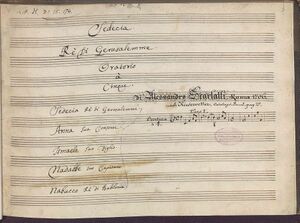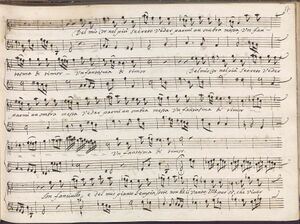Difference between revisions of "Del mio cor nel più segreto"
| (13 intermediate revisions by the same user not shown) | |||
| Line 44: | Line 44: | ||
| time = <!-- time signature if unusual or worth mentioning --> | | time = <!-- time signature if unusual or worth mentioning --> | ||
| composed = <!-- {{Timeline-event|date={{Start date|YYYY|MM|DD|df=y}}|end_date={{End date|YYYY|MM|DD|df=y}}|location=}} --> | | composed = <!-- {{Timeline-event|date={{Start date|YYYY|MM|DD|df=y}}|end_date={{End date|YYYY|MM|DD|df=y}}|location=}} --> | ||
| dedication = Sebastiano Antonio Tanari, cardinal legate | | dedication = Sebastiano Antonio Tanari, cardinal legate<ref name="Treccani"/>, Cardinale Ottoboni<ref name="GoogleBooks"/> | ||
| performed = {{date|1706||}}<!-- {{Timeline-event|date={{Start date|YYYY|MM|DD|df=y}}|location=}} --> | | performed = {{date|1706||}}<!-- {{Timeline-event|date={{Start date|YYYY|MM|DD|df=y}}|location=}} --> | ||
| published = <!-- {{Timeline-event|date={{Start date|YYYY|MM|DD|df=y}}|location=}} --><!--supposedly hAudio microformat--> | | published = <!-- {{Timeline-event|date={{Start date|YYYY|MM|DD|df=y}}|location=}} --><!--supposedly hAudio microformat--> | ||
| Line 57: | Line 57: | ||
| comment = | | comment = | ||
| premiere_date = | | premiere_date = | ||
| premiere_location = {{ | | premiere_location = {{plainlist| | ||
*Urbino (1705) | *Urbino (1705) | ||
*Rome: Seminario romano ({{date|1706-03-23}})<ref name="imslp"/>}} | *Rome: Seminario romano ({{date|1706-03-23}})<ref name="imslp"/>}} | ||
| Line 66: | Line 66: | ||
}} | }} | ||
'''"{{lang|it|Del mio cor nel più segreto}}"''' is an aria sung by the character Ismaele in Part I of the the oratorio ''[[Il Sedecia, re di Gerusalemme]]'' by [[Alessandro Scarlatti]]. The author of the libretto is [[Filippo Ortensio Fabbri]].<ref name="Treccani"/><ref name="Opac"/><ref name="Worldcat"/> | |||
The aria appeared on the following albums: | The aria appeared on the following albums: | ||
{| class="wikitable" style="white-space: no-break"; | |||
{| class="wikitable" | |||
|- | |- | ||
! width=" | ! width="60px"|Year | ||
! Album | ! Album | ||
! With | ! width="120px"|With | ||
! Ensemble | ! Ensemble | ||
! Conductor | ! Conductor | ||
| Line 81: | Line 80: | ||
| 2001 | | 2001 | ||
| [[Il Sedecia, re di Gerusalemme (Album)]] | | [[Il Sedecia, re di Gerusalemme (Album)]] | ||
| {{ | | {{plainlist| | ||
*Gérard Lesne | *Gérard Lesne | ||
*Virginie Pochon | *Virginie Pochon | ||
| Line 90: | Line 89: | ||
| Gérard Lesne (dir.) | | Gérard Lesne (dir.) | ||
|} | |} | ||
==Libretto== | ==Libretto== | ||
<div class="eighteenth"> | <div class="eighteenth"> | ||
{{Template:Song header | {{Template:Song header | ||
| title = Del mio cor nel più segreto | | title = Del mio cor nel più segreto | ||
| Line 103: | Line 101: | ||
}} | }} | ||
</div> | </div> | ||
<!-- The box above is defined in Template:Custom/songinfo.css --> | |||
</div> | <!-- The classes of the libretti are defined in Template:Custom/pjwiki.css --> | ||
<div class=" | <!-- Place <div class="wrapperlibretti"> on top of the libretto and close it in the end.--> | ||
{{ | <!-- Use Template:Libretti, not custom HTML on the page.--> | ||
<poem> | <div class="wrapperlibretti"> | ||
{{lang|it|'''Recitativo''' | {{Libretti | ||
| country =Italy | |||
| language-note = | |||
| libretto-text =<poem>{{lang|it|'''Recitativo''' | |||
NADABBE | NADABBE | ||
Tanto sperar degg'io, per te, Signore, | Tanto sperar degg'io, per te, Signore, | ||
| Line 140: | Line 141: | ||
L'ombra mesta del mio cor. | L'ombra mesta del mio cor. | ||
}} | }} | ||
</poem> | </poem>}}{{Libretti | ||
| country =Italy | |||
{{ | | language-note =Ancient Italian | ||
| libretto-text =<poem>{{lang|it|'''Recitativo''' | |||
<poem> | |||
{{lang|it|'''Recitativo''' | |||
NADABBE | NADABBE | ||
Tanto sperar degg'io, per Te, Signore, | Tanto sperar degg'io, per Te, Signore, | ||
| Line 177: | Line 175: | ||
Non mi fa I'ombra funesta | Non mi fa I'ombra funesta | ||
L'ombra mesta del mio cor.}}<ref name="GoogleBooks"/> | L'ombra mesta del mio cor.}}<ref name="GoogleBooks"/> | ||
</poem> | </poem>}} | ||
{{Clear|left}} | |||
</div> | </div> | ||
==Manuscripts and sheet music== | ==Manuscripts and sheet music== | ||
| Line 206: | Line 204: | ||
|url-status=live | |url-status=live | ||
|quote= | |quote= | ||
}} | }} | ||
==References== | ==References== | ||
| Line 268: | Line 265: | ||
|last= | |last= | ||
|first= | |first= | ||
|date= | |date=1706 | ||
|website=Google Books | |website=Google Books | ||
|publisher=Google | |publisher=Google | ||
Latest revision as of 10:19, 28 September 2021
| Il Sedecia, re di Gerusalemme | |
|---|---|
| by Alessandro Scarlatti | |
 First page of Sedecia [1] | |
| English | Zedekiah, king of Jerusalem |
| Year | 1706 |
| Libretto | Filippo Ortensio Fabbri |
| Dedication | Sebastiano Antonio Tanari, cardinal legate[2], Cardinale Ottoboni[3] |
| Performed | 1706 |
| Premiere | |
| Location |
|
"Del mio cor nel più segreto" is an aria sung by the character Ismaele in Part I of the the oratorio Il Sedecia, re di Gerusalemme by Alessandro Scarlatti. The author of the libretto is Filippo Ortensio Fabbri.[2][4][5]
The aria appeared on the following albums:
| Year | Album | With | Ensemble | Conductor |
|---|---|---|---|---|
| 2001 | Il Sedecia, re di Gerusalemme (Album) |
|
Il Seminario musicale | Gérard Lesne (dir.) |
Libretto
from Il Sedecia, re di Gerusalemme
Alessandro Scarlatti (music), Filippo Ortensio Fabbri (words)
Recitativo | |
Ancient Italian | |
Recitativo | |
Manuscripts and sheet music

- "Sedecia, Re di Gerusalemme". Scores at the International Music Score Library Project. International Music Score Library Project. Retrieved August 21, 2021.
- "Sedecia, Re di Gerusalemme, Libretto". Google Books. Google. 1706. Retrieved September 22, 2021.
References
- ↑ 1.0 1.1 1.2 *"Sedecia, Re di Gerusalemme". Scores at the International Music Score Library Project. International Music Score Library Project. Retrieved August 21, 2021.
- ↑ 2.0 2.1 "Fabbri, Filippo Ortensio". Treccani. Istituto della Enciclopedia Italiana fondata da Giovanni Treccani S.p.A. Archived from the original on 2014-06-11. Retrieved 2021-09-22.
- ↑ 3.0 3.1 "Sedecia, Re di Gerusalemme, Libretto". Google Books. Google. 1706. Retrieved September 22, 2021.
- ↑ "OPAC". Scores at the International Music Score Library Project. International Music Score Library Project. Retrieved August 21, 2021.
- ↑ "Fabbri, Filippo Ortensio". Wordcat. Archived from the original on 2021-09-22. Retrieved 2021-09-22.